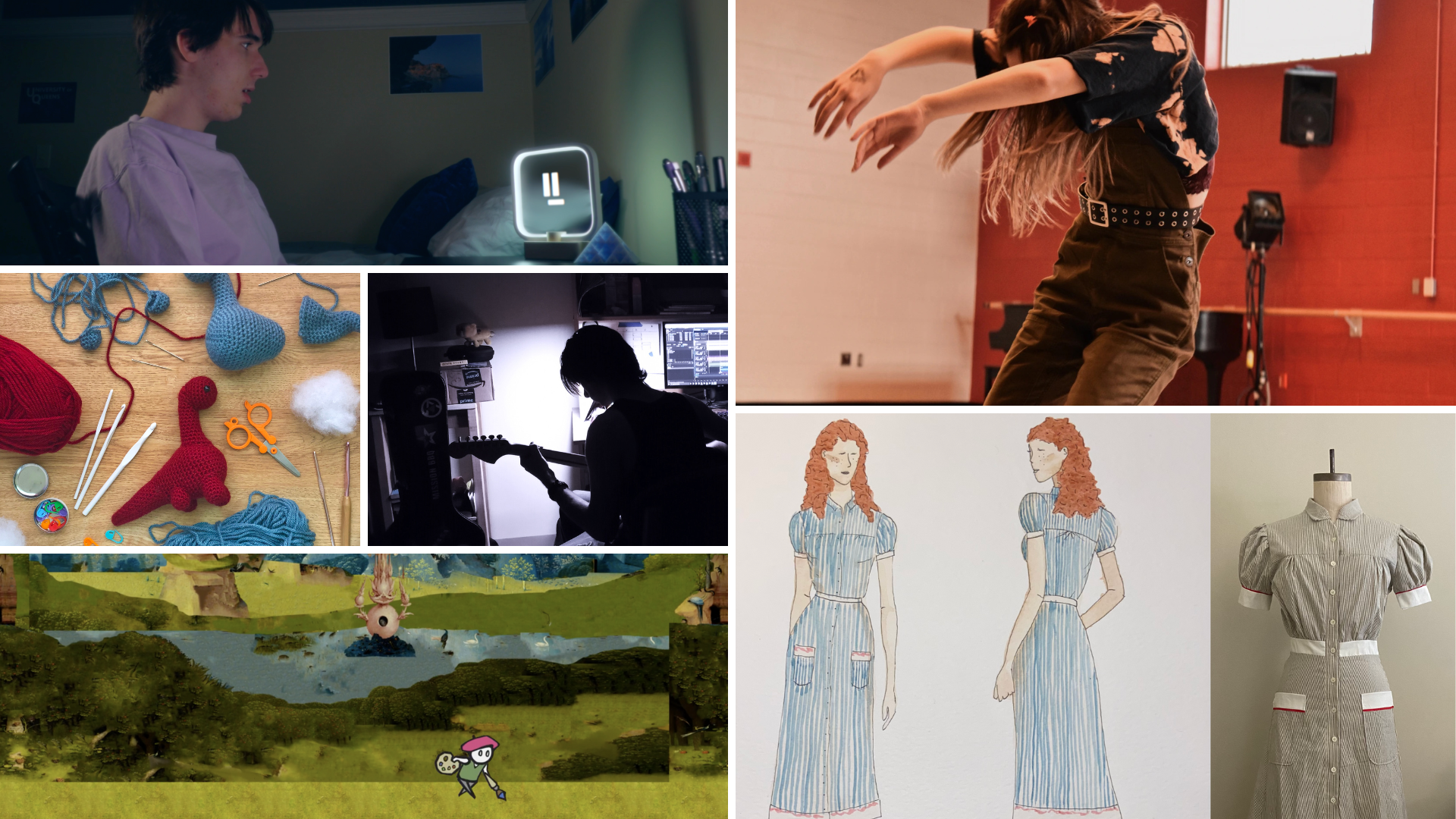Many of us have played video games, fighting off monsters and bosses to get to the next level, but did you ever think you could learn about art history at the same time? Junior computer science major Eileen Wang’s “Renaissance Rumble” combines virtual combat with 15th-century art, arming gamers with magical paintbrushes as they traverse the world of the painting.
Wang ’24 is one of six students whose research projects were celebrated last night at an awards celebration for exceptional work in the Design Cultures & Creativity (DCC) program, one of eight living-learning programs in UMD’s Honors College. In DCC, students learn fundamental principles of design, culture and creativity and apply them to their own personal and academic interests. They develop a capstone project over four semesters, pushing disciplinary boundaries through creative and socially conscious ideas.
Wang took a course in Renaissance art history at UMD and wanted to combine technology with art for her capstone. She chose Hieronymus Bosch’s “Garden of Earthly Delights” as the backdrop and coded her game to guide players through the intricately detailed painting.
“We learn best through interactive experiences,” said Wang, who received an honorable mention for her project. “My video game is like ‘Where’s Waldo?’ for art history, zooming into details from the past to help people envision the future.”
Landscape architecture major Madison Mohan ’24 also looked to the past, taking inspiration from Anthony Doerr’s historical fiction novel, “All the Light We Cannot See,” to explore costume design in period pieces. She designed and built a dress for the character of Marie-Laure LeBlanc, a blind French girl growing up during World War II.
“I visualized what she might have worn to better understand her experience,” said Mohan. “I used my imagination to fill the gaps and took some creative liberties with my design.”
Turning to a more recent period in history, Emily Sheridan ’24 created a dance film about the punk and indie underground scene in the US and UK. In “Don’t Rebel,” she drew on movement inspired by hardcore “slam dancing” to reflect the history of feminism in the punk scene, such as Patti Smith in the 70s and the Riot Grrrls in the 90s.
“Women have often been marginalized in punk, even though the scene prides itself on giving voice to the excluded,” said Sheridan, a dance and computer science double major. “I found both power and vulnerability in exploring my own voice through this work.”
Other projects turned to the role of creativity in the sciences. Elyas Masrour ’24, a computer engineering major, took inspiration from the 2008 animated movie “Wall-E” to create his own short film encouraging the next generation of policymakers and engineers to think beyond raw data and scientific facts and to consider the stories that accompany those data. He also developed a related curriculum that he has already tested with engineering students, prompting them to engage in more conversations about ethics and humanity.
“Engineers should not just build things, but they should also be storytellers,” said Masrour, who recently received a grant from the Neilom Foundation to further develop this work. “Stories are what really energize people towards change.”
Inspiring empathy was another focus of this cohort’s capstones. Corinne Martin ’24 connected her long-time interest in crocheting to the issue of mass incarceration in the United States. She came up with the idea to offer crocheting workshops in prisons, where inmates would learn to make stuffed animals and send them home to loved ones. She has designed the program and plans to implement it at a local prison release center in the coming months.
“The idea is to affirm incarcerated people’s humanity,” said Martin, a bioengineering major who also received the Capstone Award for Creativity in Pursuit of Anti-Racist Justice for this project. “Criminal justice often focuses on individual blame, preventing us from feeling empathy and reckoning with the larger social issues that create the inequities that lead to mass incarceration.”
Sam Collins ’24 looked inward to promote empathy-building through an album that he created in collaboration with a transgender friend about their transition process. Clementine Part 1 consists of seven songs, most without lyrics, that reflect the countless conversations they had about the challenges of being transgender in today’s society.
“Music conveys emotion in ways that words alone cannot,” said Collins of the album, which he described as “acid rock and post-rock—mellow, ambient and electronic.”
The students, many of whom are STEM majors, expressed gratitude for being encouraged to nurture their creative sides with the support of faculty, staff and fellow classmates.
“Because this cohort came to UMD in Fall 2020 when everything was fully remote, the students had to find their own ways to form bonds, build their own workflows, motivate themselves toward creative pursuits, and develop their identities as individuals and as a community—all while navigating the dangers of the pandemic,” said Jessica Lu, interim director of DCC. “These extraordinary students, and their work, is a testament to how cultivating a creative practice can bring inspiration, light and meaning to even the most confusing, troubling moments in our lives.”
The following awardees also received Capstone 2022 Grants to fund their projects: Corinne Martin, Madison Mohan and Emily Sheridan.
Design Cultures & Creativity (DCC) is a dynamic, social and rigorous living-learning program in the UMD Honors College. DCC has carved out a special place for driven, creative and artistic-minded students to simultaneously enjoy the access and comforts of a small, liberal arts college experience and the resources and privileges of a large research campus. Learn more at dcc.umd.edu.
By Kate Spanos ’16 Ph.D. theatre, dance, and performance studies





